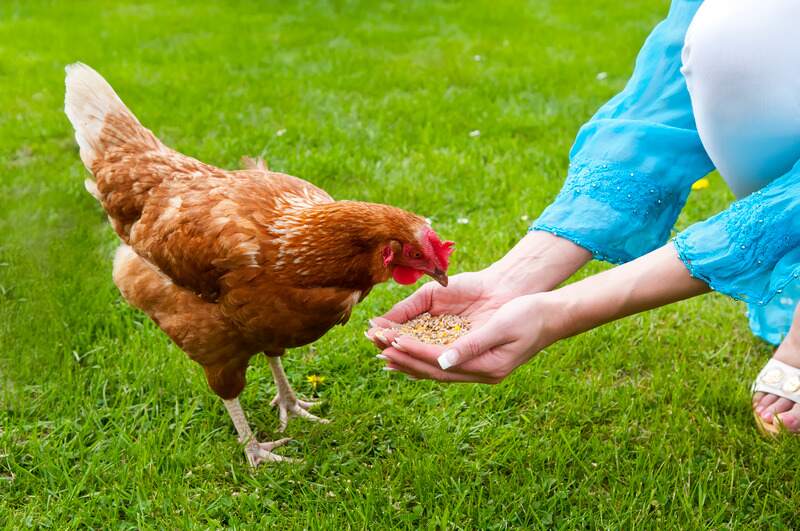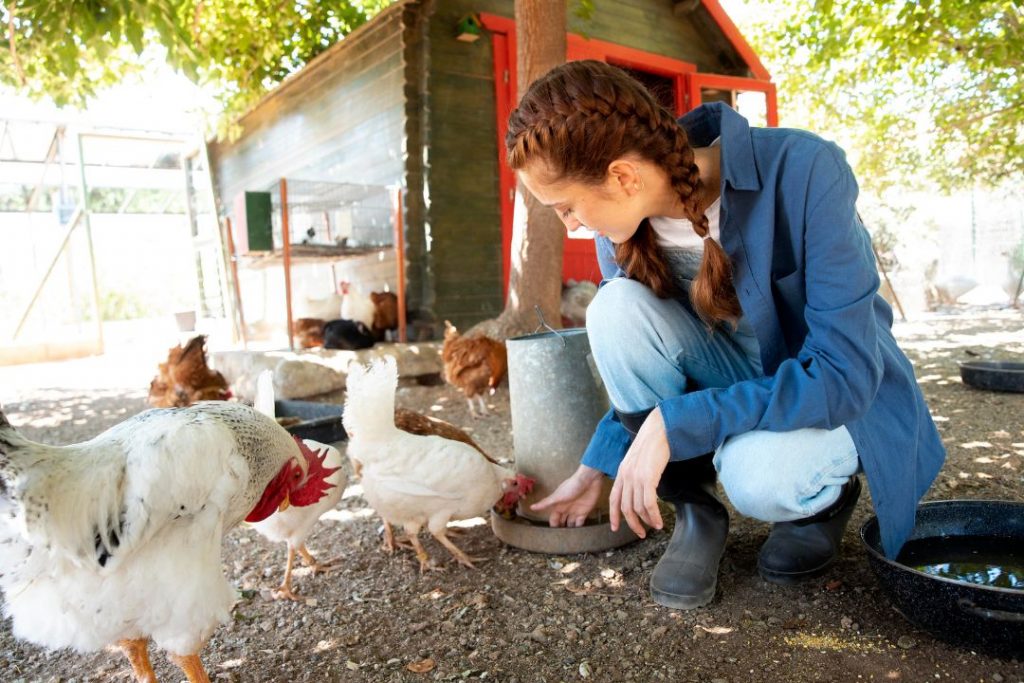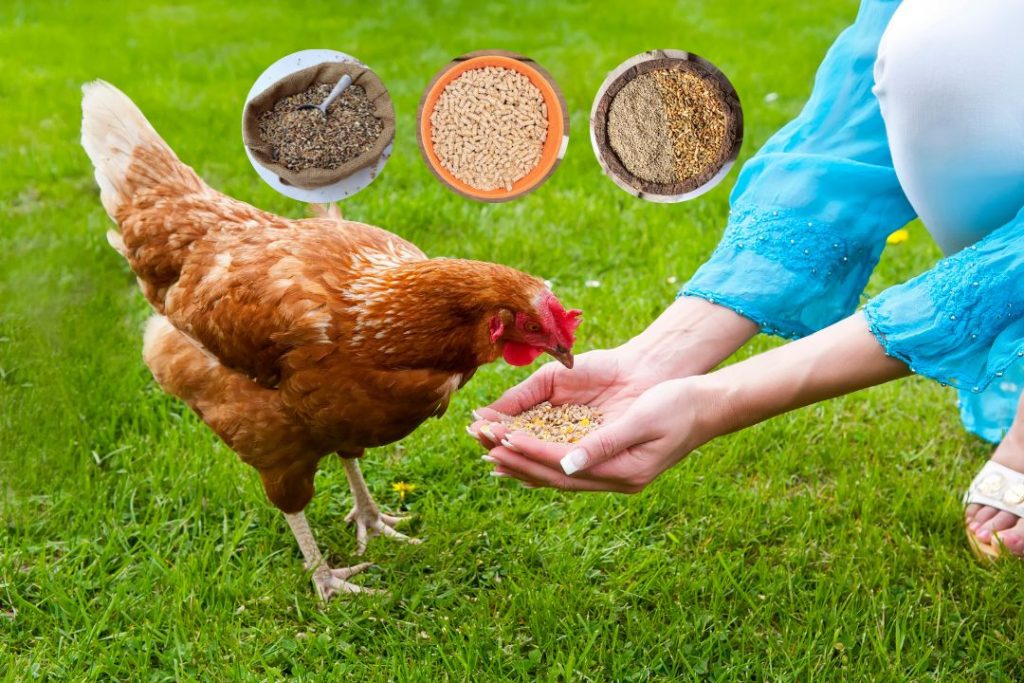Raising chickens can be a rewarding and enjoyable experience, not to mention the delicious eggs you can enjoy! But to ensure your chickens are healthy and happy, you need to make sure you’re feeding them the best food.
You need to choose the best feed for your chicken while they are a baby or adolescent, growing or pullets or laying eggs. However, you must select a feed that will ensure enough protein, calcium, and other nutrients for your birds. And your flock will grow faster by eating the best feed.
In this ultimate guide to choosing the best chicken feeds in 2023, we’ll provide you with all the information you need to make sure your chickens are getting the best nutrition. Learn about the different types of feeds available, their nutritional benefits, and more. Get your flock ready for the best possible health in 2023!
How To Choose The Best Chicken Feed?

Choosing the best chicken feed according to the age of your birds is important. There are several available feed options to choose from. But you shouldn’t pick one randomly for your birds. To select the best feed, consider the following:
Chicks & Adolescents
You need to pick a feed that is rich in protein for your young chicks. The protein-rich feed is easily digestible. In the first stage of their development, when your chickens are less than eight weeks old, you should pick the crumble or mash. Both of these contain protein at 18% – 20%. For your broiler chicks, select a feed that is 24% protein.
Pullets & Hens
When the age of your birds becomes 14 weeks, you need to change the feed type and pick another one. Select a feed that is rich in calcium and contains enough protein. Calcium makes the laying hen’s egg and eggshell strong.
Without enough calcium, the eggs will be misshapen and soft. Calcium strengthens the eggshell and provides a sufficient barrier to keep the egg safe. Pullets mature quickly and start laying eggs. Therefore, for your pullets, you should select a feed with 3%-5% calcium.
Broilers
To feed your fast-growing broilers, you must select feed with 20% – 22% protein. The broilers will grow steadily due to this protein. But if you have a mixed flock with Cornish hens and ducks, then you should select the lower protein-based feed. 18% -20% protein is best for your mixed flock for their size and leanness.
Carefully choose the feed with enough protein to allow the broiler to grow fast and healthy.
Shell & Grit
Chickens have no teeth. And therefore, they greatly depend on grit as it helps to digest or grind down hard foods. Without grit, the mash and crumble are the ideal feed. But to ensure the healthy digestive system of your flock, you need to supply grit to them.
Usually, oyster shells are the main elements of most store-bought grit. But using the baked eggshells, you can make the grit by yourself. However, crush the eggshells finely if you decide to make the grit yourself.
Ensure the eggshells are baked so finely that your chickens will fail to recognize them. Because if your hens recognize the eggshells, they will become curious about the taste of their eggs.
Scratch
Chicken loves the scratch combination of corn and seed. The scratch is a refreshing, crunchy, satisfying treat for your flock. Therefore you can choose this feed for your chickens, also. But ensure that only 10% feed of the diet of your birds contains scratch.
Scratch is tasty and fun, but it’s like junk food. Therefore you should give a moderate amount of scratch to your flock. Add the scratch feed to your chickens’ diet and give them a funny and satisfying treat.
Also Read: What To Feed A Chicken With A Broken Beak?
What Nutrients Do Chickens Require?
80% of the cost depends on feed of poultry production. Feed ensures good nutrition to the flock. Depending on whether you are raising your hens for eggs or meat production, the chicken feed formulations will vary. However, your birds require six basic nutrients, and those are:
- Protein
- Fat
- Carbohydrates
- Minerals
- Vitamins and
- Water
A deficiency of these nutrients in the feed hampers overall poultry production. However, when choosing poultry feed, you have to ensure that all the necessary nutrition’s available in the feed. The amount of protein in starter and grower feed is typically 18% to 20%. This helps grow and develop your chicken’s muscles, bones, internal organs, and immunity. In your chicken’s diet feed, a sufficient amount of protein is crucial.
How Much Feed Do Chickens Require?
How much feed your chicken requires you will get to know it by observing your flock for a few days. Actually, the ideal amount of daily feed depends on the eating capacity of your birds. Every flock’s feeding capacity is not the same since every breed is different. However, we are providing a solid starting point here to provide you with an initial idea.
Per day a fully grown chicken eats ¼ pound of feed. This implies that approximately every bird will consume 1.5 pounds of feed in a week. The feeding amount varies based on the size and age of your chicken. An adult laying chicken in a week can eat about 1.75 Lbs of feed. That means per day, an adult chick requires 3.5-4 ounces of feed.
On the other hand, baby chicks eat nearly 1-2 ounces of feed in the first eight weeks. That means your baby birds will eat ¾ to 1 pound of feed per week. And the baby chicks drink more than three times a day.
How much feed your flock requires to check it, the best way is to inspect the feeders after your chicks eat fully. After giving a certain amount of feed if anything is left in the feeder, the next day, adjust the amount by doing the up and down. A rule of thumb is you should provide enough feed to your chicken instead of less.
How Do I Know I’m Buying The Correct Feed?
Different poultry feed is available in the market, but whether you are picking the correct feed or not is the question. While buying the feed, try to get the answer to the following questions. The answers will help you understand that you are purchasing the correct feed.
Did the Feed Meet the Nutritional Requirements?
As we already mentioned, your chicken for fast growth requires different vitamins, carbohydrates, protein, and fat. So while buying the feed, ensure it contains 18% -20% protein with other nutrients like fat, minerals, water, etc.
How Is the Poultry Feed Formulated?
Different brands formulate poultry feed in numerous ways. Now whether the feed is formulated from soybean, corn, oyster etc., you have to consider it also. Soybean meal and corn are the main protein source in commercial chicken feed. Therefore you can pick the one that is formulated from these two elements. It will ensure enough protein for your birds.
However, considering the traditional chicken feed choice, some companies formulate corn-free and soya-free feed. This type of feed is not widespread or available everywhere. If you want organic feed for your chicken, go for the soy-free and corn-free formulated feed.
Another formulated form of chicken feed is pellet and crumble. Also, the mash form is available. Poultry feed is formulated from different types of elements. You should pick the best one for your flock that will satisfy all the nutritional requirements.
Popular Chicken Feed Brands / Best Chicken Feeds
Whether you already have a big flock or just starting with a few birds, you need to do a little research to find popular chicken feed brands. There are so many brands available in the market. But not all brands offer you the best feed or the highest value.
Therefore while buying the feed, you need to pick the best brands. However, to assist you in finding the best brand, we have put together several brand names in this guide. Go through the following top poultry feed brands.
- Overall best chicken feed – Scratch and Peck Chicken Layer Feed
- Best runner-up chicken feed – Manna Pro Layer Feed
- Best brand for all stages – Hiland Naturals Chicken Layer Feed
- Best Non-GMO chicken feed – Prairie’s Choice Non-GMO Backyard Chicken Feed
- The best chicken feed with calcium – Kalmabach Chicken Layer Feed
- The best chicken feed with natural plant protein – Brown’s Layer Booster Chicken Feed
Also Read: What To Feed A Chicken With A Broken Beak?
Frequently Asked Questions
What Are the Best Ingredients for Chicken Feed?
Soybean meal, corn, wheat or wheat middling are the best ingredients for your chicken feed. Some feed also contains cereal and its byproducts. Corn, wheat, barley, sorghum or rye are the cereals in poultry feed.
What Are the Healthiest Things to Feed Chickens?
A nutritionally balanced diet is the healthiest thing to feed your chicken. Some of the most beneficial things are cooked beans, leafy greens, fruits, vegetables, non-sugary grains, and cereals.
What Food Increases Egg Production?
Whole grains, leafy greens, fresh vegetables, nuts, meats, etc., increase the egg production of your chickens.
Final Thoughts
Hopefully, this article has been helpful to you. Now you have learned all the details about the best chicken feed. Optimistically you will now select the best feed for your chickens from the available brands in the market. Only the best feed can provide sufficient nutrition to your flock. And your birds will grow healthy and faster.
However, if you have any other queries on chicken feed, don’t hesitate to comment. Soon we will reply to you.
Raising Chickens 101: A Beginner’s Guide
Get started in chicken raising with our expert-approved guide. From building a coop to hatching eggs, you’ll learn all the essential information you need to know. Topics include selecting breeds, caring for chicks, increasing egg production, and more. We also cover chicken feeds, behavior, disease prevention, and essential vitamins and minerals. Follow this guide for a successful and fulfilling experience.
Want to learn more about chicken raising? Check out our beginner’s guide below for even more tips and information:
- Building a Chicken Coop
- Selecting the Right Backyard Chicken Breeds
- Incubating and Hatching Chicken Eggs
- Raising Baby Chicks
- Caring for Pullets
- Increasing Egg Production
- Types of Chicken Feeds
- Understanding Chicken Behavior
- Recognizing and Treating Chicken Diseases
- Providing Essential Vitamins and Minerals


